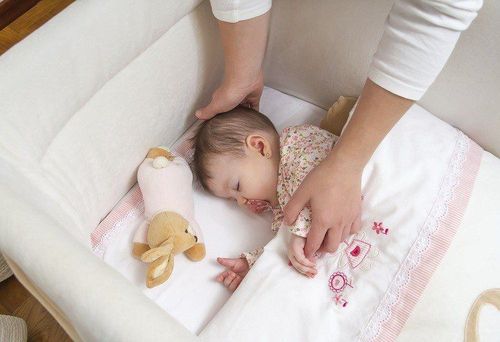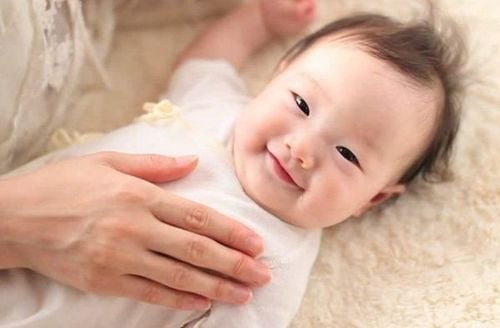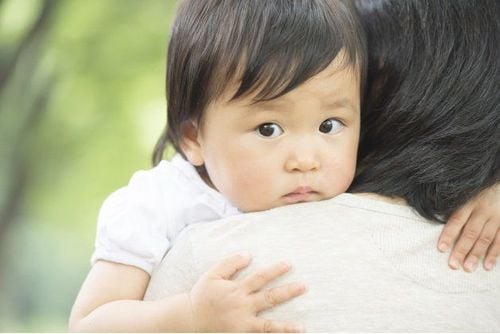This is an automatically translated article.
Children's sleep plays a very important role in the process of physical and intellectual development. Putting your baby to bed alone can help build independence early on. However, “at what age should children sleep separately?” and “how to train children to sleep separately to be effective?” This is a challenge for parents.
1. Reasons why children should sleep separately
Teaching babies to sleep separately can bring many health benefits, and at the same time forming good habits:
Teaching babies to sleep separately reduces the risk of neonatal death: Studies in the UK have shown that, Putting babies to bed separately will reduce the risk of sudden infant death. In fact, more than half of infant deaths are caused by mother pressing and causing suffocation. Learning to put your baby to sleep alone will make it easier to fall asleep: When children sleep with their parents, they can form some bad habits such as asking for food in the middle of the night or fussing. In particular, parents can also be the cause of affecting children's sleep. These things will make it more difficult for the child to fall asleep, not even have the habit of falling asleep on his own or have difficulty falling back to sleep if he wakes up at night. Therefore, if children are allowed to sleep separately, they can practice the habit of lulling themselves to sleep and sleep more deeply. The right and regular sleep time will help children form the biological clock from an early age. Letting children sleep separately will help form the habit of independence when they grow up. When children sleep separately, it can help avoid negative effects on psychology: If sleeping with parents, children may encounter situations that are not good for their psycho-physiological development. such as: Parents arguing, acts of domestic violence... These images, if children witness a lot, will be deeply ingrained in their minds and affect their psychological development later on. Some children may experience significant psychological trauma.

Tập cho bé ngủ riêng có thể mang lại nhiều lợi ích sức khỏe
2. Time to make children sleep separately
Choosing when to put your baby to sleep will depend on the individual. If the child cooperates, parents can let the child sleep separately from an early age. In the case that the child has grown up and still does not want to go to sleep alone, parents also need to have convincing measures.
Parents should not let children sleep alone too late, especially after 3 years old. Because, at this stage, children have the ability to distinguish sex, if they continue to sleep with their parents, they may encounter ironic situations. In Vietnam, it is very difficult for children to sleep separately at the age of 3, which can lead to anxiety and fear. Even so, parents should still seek persuasion and reassurance so that children can sleep on their own when they are about 4 to 6 years old.
The earliest time to put your baby to sleep alone can start from 4 to 6 weeks of age. At that time, parents can use their own crib or bed so that the child can sleep alone while still being able to observe the safety of the child.
3. How to effectively train children to sleep separately
How to train your baby to sleep separately is quite important and determines a lot to the success or failure of this job. Parents can add tips to find out how to put their children to sleep separately and still maintain peace in the family:
Parents, let your baby sleep separately from a very young age: In fact, If a baby is too small to sleep alone, it can make parents feel worried and think a lot. However, in the long run, it is the right decision to help children sleep alone in the most comfortable way. Use gentle and rational language to persuade children to sleep on their own: For children, the use of reprimanding or negative words can make language exchange difficult. difficult, even children may overreact. In order for children to voluntarily go to sleep alone, parents should use soft and reasonable words to persuade. At the same time, teach children how to do it most effectively. Parents teach children to practice independence: If the child cannot sleep without a parent beside him, it is necessary to have a specific step-by-step plan to re-train his child's independence. For example, parents can agree and sit on the bed for the child to sleep, then will slowly move to sit in a chair or a certain position in the room, and can finally go out of the room completely when the child was fast asleep. Parents practice letting children sleep separately but not in a hurry: Going to bed separately is considered a big turning point for children. In order for children to get used to this activity, parents should do it slowly and the speed will depend on the child's ability. It may take a few weeks to convince your child to do this. If you are in a hurry, all efforts to put your baby to sleep alone will likely fail. Parents help children maintain separate sleep habits. Sometimes parents can also encourage children to sleep separately by indulging some of their little hobbies. Talk to your child about early sleep problems. This can give the child time to mentally prepare and be ready to participate in the activity. Parents also need to understand their children's fears in the case of separate sleep and soothe them. Any fear will make it more difficult for your baby to sleep alone. Parents always show love and care for their children. Most children like to sleep in the embrace and caress of their parents. So parents can hug and kiss their children before going to bed to make them feel loved and protected.

Cách tập cho bé ngủ riêng khá quan trọng
In short, putting children to sleep separately from an early age but still under the control of parents will help form good habits, and also bring many health benefits in children. However, to do this, parents need to be skillful, persistent and have a specific plan.
Please dial HOTLINE for more information or register for an appointment HERE. Download MyVinmec app to make appointments faster and to manage your bookings easily.













